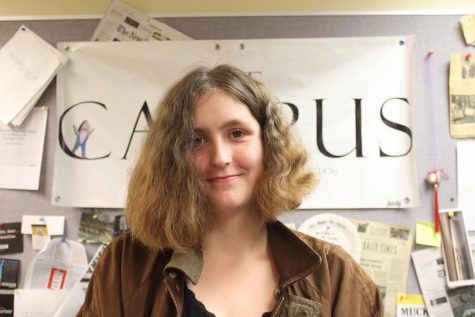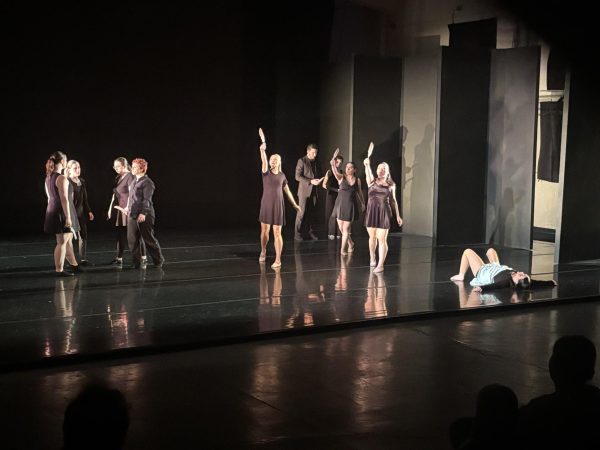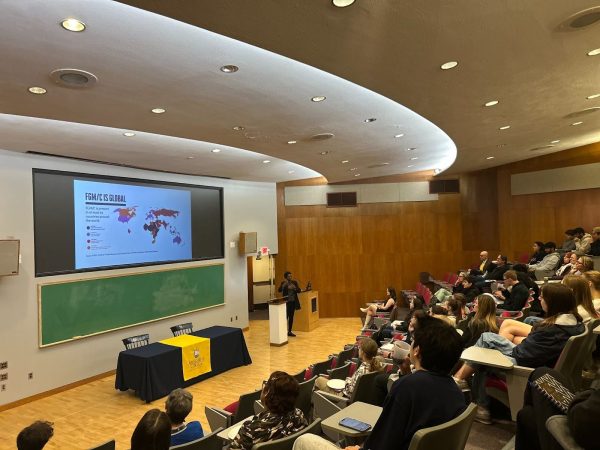AGES, Yeckley discuss queer issues on campus
The All Gender Equity Society started the semester off by holding a meeting to discuss assets, issues and resources within the Allegheny College community with Dean for Student Life Trae Yeckley as a guest speaker last Thursday, Feb. 2, in room 303 of the Henderson Campus Center.
The discussion started off on a “positive note” by talking about what Allegheny has to offer, as stated by AGES President Cam Lesher, ’24. The board and attendees talked about the biggest assets that Allegheny College has within the community.
“I think the location of this college is near perfect because this is a college with so many queer people, and it is incredible,” Sabrina Seda, ’25, said in response. “However, it is located right in Meadville, which is extremely right-wing, so I cannot imagine how many queer students live locally and found refuge and safety. A few of the storefronts and jobs in the town are open and show their support, too. And honestly, I don’t think the town would have the backbone to do that if there wasn’t such a huge collective of queer and queer-supporting people in this town as a result of the college’s action.”
An idea that both Lesher and Seda brought up was the available diversity of interests to students, ranging from major and minor combinations to clubs to cultures. These resources make it easier for students to find and build communities, suggested Seda.
The discussion then moved on to barriers that students have to navigate as queer people. Yeckley opened up by talking about moments of discrimination and misgendering they go through.
“Even as an administrator, while people on the surface will tell me they respect my identity and my pronouns, the (number) of times I’ve been misgendered — and I’ve been here six years — drives me crazy,” Yeckley said. “Even though there’s a lot of support on campus and I feel very supported, there are still administrators and campus faculty who struggle with pronouns.”
Milo Watson, ’26, also felt that misgendering and incorrect pronoun use is a problem among professors, staff and administrators.
“Allegheny is a space where I feel most supported in my queerness more than anywhere else, but I’ve definitely seen people get misgendered by the dining hall staff,” Watson said.
Lesher connected the pronouns issue to a broader issue of transphobia on campus, and opened up about recent events that he went through.
“So last week, I forgot my keys in one of the academic buildings, and I had to call Public Safety to let me in,” said Lesher. “I gave them my name and student ID. And they had to have me confirm my identity. And instead of using the name that I said they used my deadname instead of asking me for something like my birthday. They asked for my middle name, too, which is also my deadname. I’ve had issues every time I’ve called Public Safety and them misgendering me.”
The group also discussed housing organization and Residence Life mistakenly putting queer individuals in non-gender inclusive halls and vice versa. Lesher explained that there have been many instances in which trans individuals are placed into wrong dorms or cisgendered people are placed in gender-inclusive halls without wanting to be there.
“Res Life doesn’t always see things from the perspective of ‘not everyone is cis,’ and there’s a lot of things to think about,” said Yeckley. “As queers, we have to think about when we go to the bathroom. We have to think about if we’re comfortable with straight guys on the floor and whether they’re comfortable with us living on the floor, and we spend our entire lives trying to make everyone else comfortable. But when we go back to our dorm, we don’t want to have to think about making people comfortable, we just want to be us. So I think on my part, I can provide some more education, especially for the housing folks who do the placement, to make them be more aware of these issues.”
Watson also mentioned a lack of gender-inclusive halls, lounges and bathrooms. Even within Brooks Dining Hall, there are women’s and men’s bathrooms, but no gender-inclusive restroom.
AGES also touched on issues on campus that are not queer-related, such as wheelchair accessibility and resources, domestic violence awareness and Title IX, and consent education.
“I would really like if there was more of a presence of domestic violence education,” Watson said. “So many people say they know what Title IX is, but they can’t actually describe it and don’t know where to go and what they can do. And some people who have suffered violence on this campus have the sentiment that Title IX does not work. And that is not a good thing.”
The meeting began drawing to a conclusion with a discussion of helpful resources Allegheny College has available.
“Helpful resources for me are between the queer-positive clubs like AGES, which helped me learn how to apply queerness to myself, and the IDEAS center because of the support and resources available there for those who need it,” Seda said.
As a way to have important conversations about what needs to be changed on campus, Yeckley intends to bring back monthly trans and nonbinary meet-ups. Yeckley explained that the meetings are similar to AGES, except with more of an explicit hope of learning what needs to be done differently and what students find helpful.
“I love Allegheny students because they’re not going to sit by and let discrimination happen,” Yeckley said. “I appreciate that students will actually call their faculty and administrators out and explain when something isn’t okay.”

Elanor Bonta is a first-year from Shanghai, China. She is majoring in psychology and minoring in biology.






